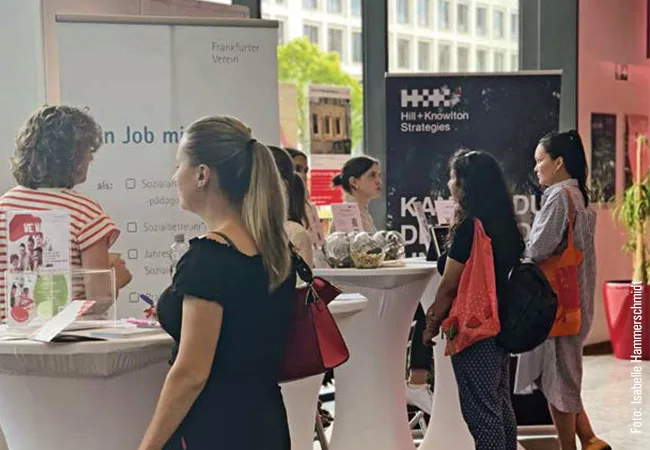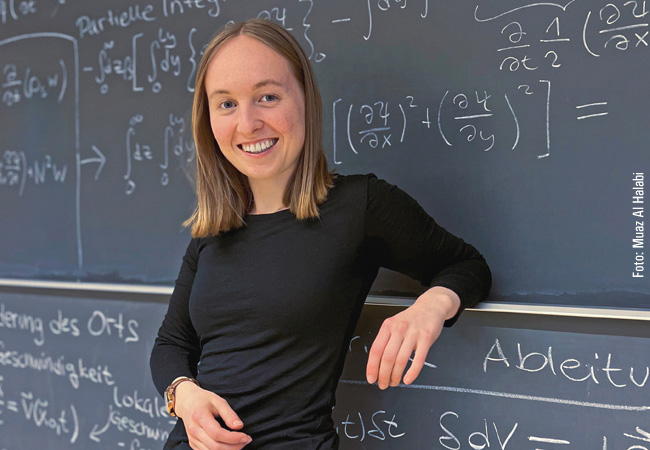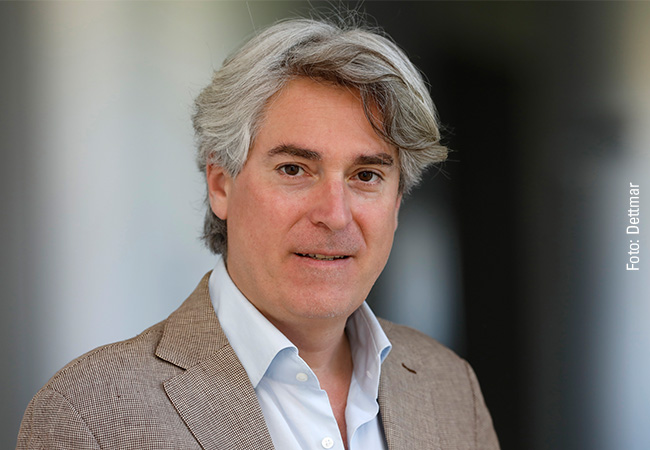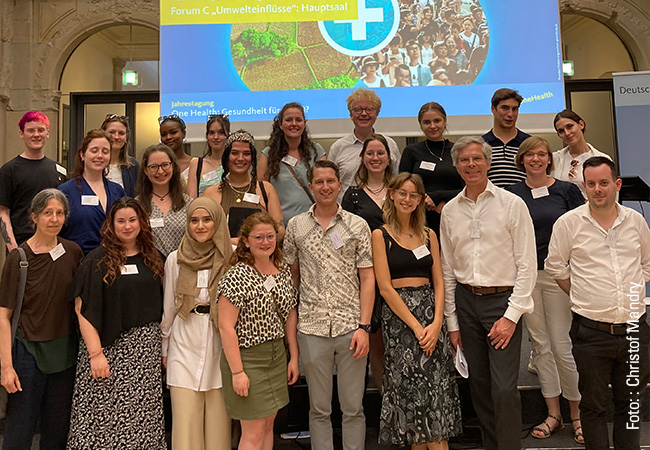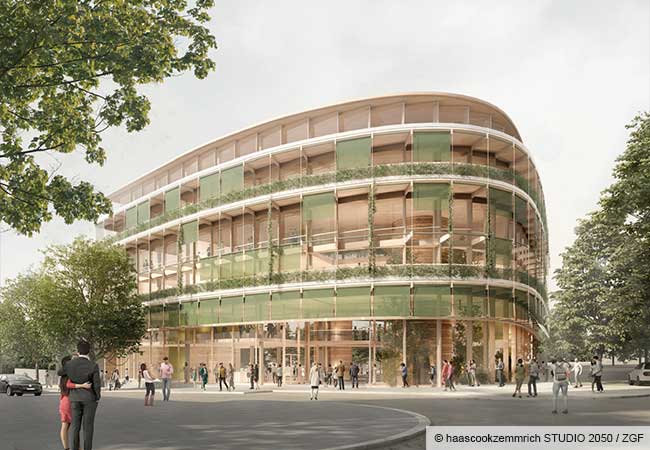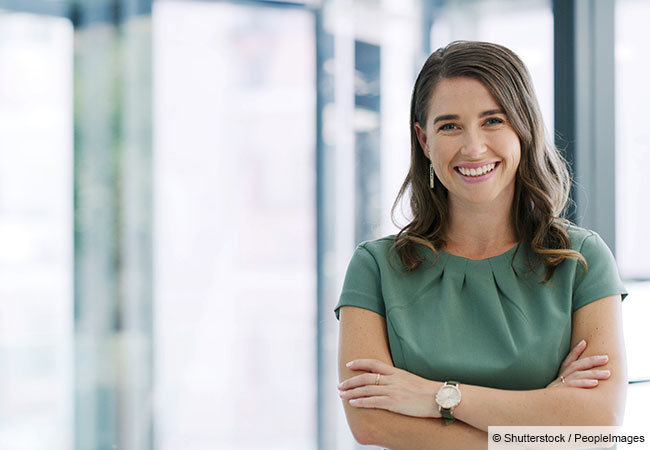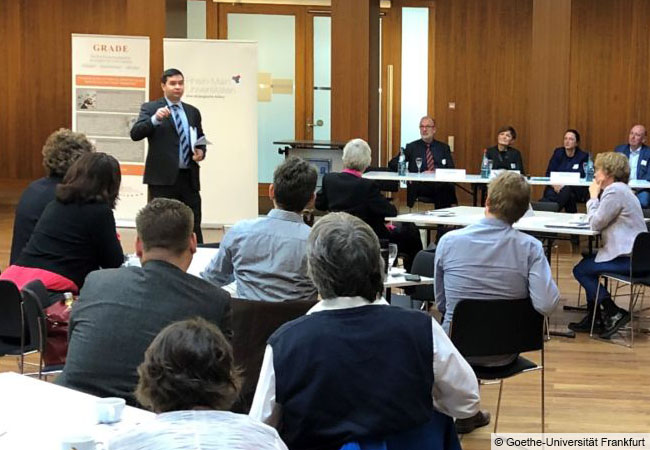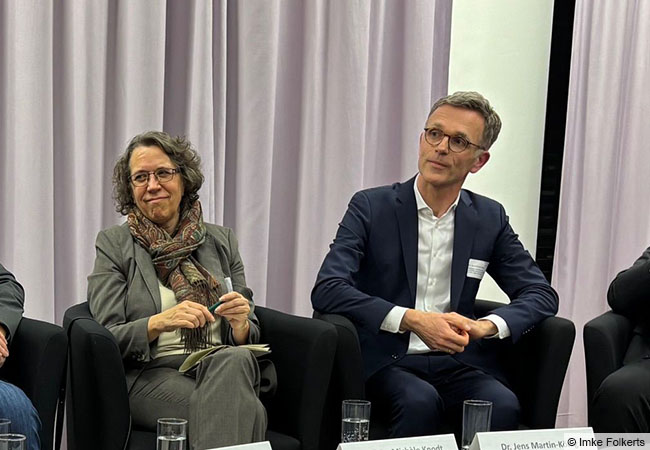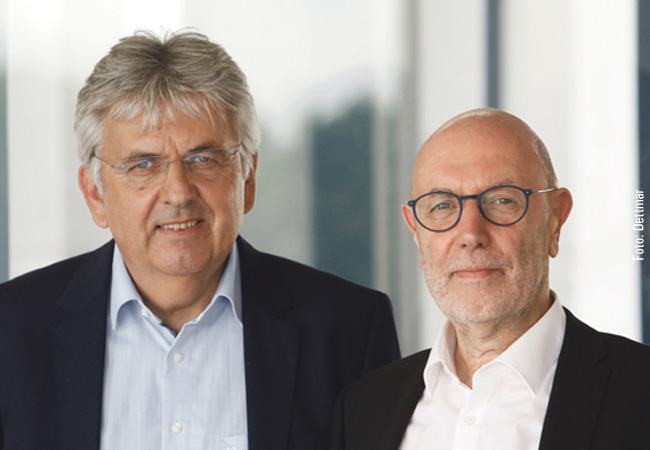
Passing on the baton: Dr. Ulrich Breuer succeeds Dr. Albrecht Fester as Head of Administration at Goethe University Frankfurt. In an exclusive interview with UniReport, both men talk about their careers, the courage to make a fresh start, and the challenge of remaining calm even when managing difficult situations.
UniReport: Mr. Fester, you have spent almost 20 years within university administration, including as radiation protection officer, and have served as Head of Administration since 2018.
Dr. Albrecht Fester: That is correct. Even before that, however, I worked as a research scientist at the university for 17 years. So, in fact, I spent about half my working life in research and the other half in administration – and as a result have built up a lot of experience in both fields. For much of my professional life, I worked as facility manager in the core business of real estate and construction. When I became Head of Administration, the focus lay on these challenging facility development topics, but also on digitalization and personnel development.
You were the face of facility development for a long time. During that time, many exciting structures were built, demolished, or blown up. Do you have a favorite building on any of Goethe University’s campuses?
Fester: I once did a count: On my watch, twelve large buildings went into operation. As for my favorite building – I love the Auditorium just as much as the Biologicum on Riedberg Campus, or for that matter the Seminar Building and its Pavilion. Incidentally, these two were the first buildings where Goethe University actually also served as the building contractor. It was very important to me that we get to that stage. Implementation occurs in turns and as part of a closely aligned process with the federal state of Hesse and its office for construction and real estate. We are currently building the Center for Humanities on Westend Campus, and an S3 laboratory in Niederrad. We are also implementing some of the big COME projects ourselves.
Looking back, what were major highlights or particularly remarkable events?
Fester: The demolition of the atomic research reactor was of course a very special event, which occurred right at the beginning of my administrative career, and one I still think of with a certain sense of pride. Other major “highlights” were blowing up the AfE tower, and the unexploded bomb discovered here on Westend Campus, which prompted a complete evacuation. This was the first time we were genuinely in danger of losing a large number of our own buildings. Also worth mentioning is the total failure of the entire heat and fire detector control system in the PEG Building just a short while after it was commissioned in 2013. That being said, however, I have to admit that crises like these did have a certain appeal for me, despite their challenging nature.
How did you manage to keep calm and convey to others the feeling that “We’ll get through this”?
Fester: Part of it definitely has to do with having a certain sense of routine in such matters. However, it’s definitely also a question of personality. When I look at my successor Mr. Breuer, I also see a person who radiates calmness. Of course, some of the many topics the Head of Administration has to deal with will at times give cause for worry. My decision to take on the position of Head of Administration in 2018 was greatly influenced by our poor performance in the excellence initiative. My feeling at the time was that the university had a special need for stability and calmness.
What character traits and/or experience should a Head of Administration bring to the job?
Fester: While I don’t have a background in finance, I can certainly handle numbers. Being married to a lawyer also helps me understand legal topics; and a radiation protection officer must consider courses of action from mainly a judicial perspective. In addition to my background in natural sciences, I obviously also have a very good understanding of technical and technological matters like heavy-duty electrical power and microelectronics, for instance.
There’s a lot of talk about the tense financial situation at universities.
Fester: That to me is just one side of the coin. After all, with a budget of almost half a billion euros, which Goethe University has at its disposal, there’s a lot of money in the system. In many cases, it’s more a question of having a balanced discussion about how to distribute the funds – which shows that there is always room for flexibility. Over the course of just nine months, we managed to save an eight-figure sum thanks to our energy-saving measures. That being said, we’re also faced with a new round of wage increases, the final cost of which is currently estimated at nearly 20 million euros, which we’ll have to take from somewhere. While I do see these as major challenges, I’m optimistic that we will manage to solve them.
Mr. Breuer, both you and Mr. Fester started out in the natural sciences. Mr. Fester is a chemist and you’re a physicist. What do natural scientists bring to the job, and what do they have to learn?
Dr. Ulrich Breuer: I have been working in science management for 32 years. My scientific career was relatively short. After having finished my doctorate, the Chair of the Board of Directors at the Forschungszentrum Jülich research center asked me whether I would like to become his personal assistant. Since then I have in effect been working in management and administration. As a physicist, you quickly familiarize yourself with complex systems, and try to focus on the main parameters while working with estimates. Take the topic of financial planning for instance: While it makes little sense to try and figure out the final tally down to the last three decimal places, it is important in the beginning to have certain estimates, which serve as an indication of whether your planning is going to work out or not. I try to think systemically, and not merely optimize parts of a process. In my experience, that generally results in more work somewhere else.
Have you set yourself a program for the first 100 days?
Breuer: My goal for my first 100 days is to discover as much as possible, starting with my own area of responsibility, and then approach people – and by that I mean not only the managers. My first day at the GSI [Helmholtzzentrum für Schwerionenforschung] was also the first day of the COVID lockdown in spring 2020. As a result, my contacts with other people were purely virtual for almost two years. That will of course be different here at Goethe University. It important for me to see where exactly our employees are located – are they sitting in an old building that hasn’t been renovated for 50 years, because we’re short of space right now? A key focus of mine will be processes/workflows. Here, the internal system of checks and balances also plays an important role, as in the case of the cross-check principle in financially relevant workflows. Of course, another focus will be on digitalization. Incidentally, I had to fill out the personnel form here using a pen, including entering my own 20-digit IBAN. The digitalization of processes will thus also be a big topic.
CIO Ulrich Schielein will be a good partner for that.
Breuer: True, and that is of course also important given the size of this task.
Fester: The fact that Mr. Breuer had to fill out his personnel form with a pen is obviously something I didn’t manage to tackle during my time in office. On the other hand, I introduced a digital learning management system that now has some 1,500 users and hundreds of scheduled events, and has become a key element of our in-house training.
If you think back to your own studies, what sort of student were you?
Breuer: I studied physics at RWTH Aachen University. Aachen is an attractive city that I was familiar with because I played table tennis for Alemannia Aachen before I started my degree. It is also the city where I met my wife. So I was already well established there. I thoroughly enjoyed my university studies; for me it was the first time having the freedom to do what I want.
How do you usually start your working day?
Breuer: I will come in each morning from Karlsruhe, which means I’ll get up early, and the first thing I need is a coffee. I’m the sort of person who reacts relatively quickly. When you are in a management position, you always have to keep several balls in the air at once, because things have to run simultaneously. I have been told that I work very methodically; so far, that has always proved helpful. I also trust those around me and give them a lot of room to make decisions – another key characteristic of mine. If an expert tells me something, I listen to them, and assess and accept what they say. When you are working in management or administration at publicly funded institutions, it is often impossible to change the existing framework conditions, or – if it can be done – the change process in such rigid systems is extremely slow. What this means is that you have to exploit whatever leeway you have.
In view of the shortage of skilled labor in Germany, it will be crucial to identify and probe such leeway more often.
Breuer: I think one very important aspect is to invest in one’s own education. Together with other public institutions in the Rhine Main region, we could for example think about instituting staff exchanges, say, between the university and a university of applied sciences or other institutions – in both directions. Staff members who wish to gain more qualifications should be given the opportunity to do so. The result will be highly motivated people, who want to shape the future.
Fester: I agree. In my opinion, we also have far too few apprentices. That is why I have set up an intensive marketing program together with Human Resources to acquire apprentices. It is entirely up to us to train people, to arouse their enthusiasm.
Mr. Fester, can you think of anything you wish you had achieved?
Fester: No, not really. Obviously, I wish the new chemistry building were already finished and ready to use. The first construction phase is now underway and the other two will follow. As Mr. Breuer already correctly pointed out, you have to come to terms with the overall conditions and try to moderate the whole thing. Doing so demands a great deal of perseverance. Sometimes you also have to accept that progress comes in a piecemeal fashion.
Breuer: I’ve adopted a saying from one of the former presidents of the Helmholtz Association: “We overestimate what we can achieve in one year, and we dramatically underestimate what we can achieve in ten years.” There’s a lot of truth in that. We’re always under pressure to get things done quickly, when we actually need to adopt longer-term thinking. The Westend Campus is a good example of this: It wasn’t created in one year, but over a long period – and I think the end result is outstanding.
Both of you did not start out as university administrators, but as scientists, and thus personify the fact that you can do different things during different phases of your life.
Breuer: Absolutely. It really doesn’t matter which scientific discipline you come from. You have to be willing to learn new things, and now and then also recognize that you may have a deficit in one area that can be remedied by training. I didn’t come to Goethe University just to sit out my six-year term. I also want to learn something new here.
Fester: I see this in many students who sometimes have a hard time deciding on the direction of their career. Maybe they think they will have to remain in that field for the rest of their lives? During my long career, doors opened time and again, and I had the courage to go through them and do something different. Continuing the university’s human resource development can also mean that more employees are open to not doing the same thing for 30 years, but develop a willingness to try out other career options. At the same time, making this possible also turns the university into a more interesting employer.
Mr. Fester, what are you looking forward to in your retirement?
Fester: I’ve spent a lot of time working on projects in a very structured way for many years, and it’ll be important to have time for a breather. Of course, there are projects waiting for me at home, such as my parents’ house, a photovoltaic system and a heat pump, but also dancing, sports and yoga. I’m glad to have more time for my family. Mind you, those who know me have already said, “You’re never going to stop working,” but I replied, “It’ll happen.” (Laughs.) The prospects for this next stage of my life feel very, very good. I hope I’ll stay as healthy as I am now, and that I will find other things in which to invest my energy.
Questions: Imke Folkerts and Dirk Frank


